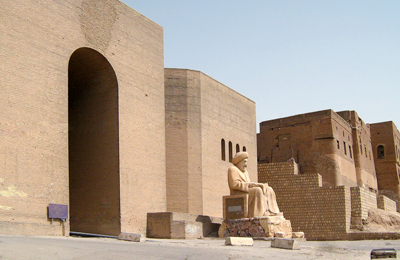Investing in Iraq

Mohamed Al-Khanaty sets out a brief overview of the important developments for Iraq’s reconstruction efforts after strengthening bilateral ties with Jordan.
Iraq’s economy experienced a tumultuous phase for the past three years due to a relentless security threat and volatility from a slump in oil prices. Despite these challenges, the Iraqi Government has taken concrete steps to improve the investment framework during this period to help rebuild and modernise the economy away from oil dependency.
On November 18, 2015, Iraq took a major leap by ratifying the Convention on the Settlement of Investment Disputes between States and Nationals of Other States of 1965 (commonly known as the ICSID Convention). Less than a month later on December 6, 2015, the Iraqi Investment Law No. (13) of 2006 was amended to provide greater protection for foreign investors. In January of 2015, Iraq ratified the Treaty on Reciprocal Promotion and Protection of Investments between Iraq and Jordan, which came into force in November 2016 following Jordan’s ratification. It cannot be overstated that these strategic developments were implemented at a time when investor confidence was declining amid heightened security and economic turmoil in Iraq.
Following liberation of Mosul in July 2017, interest from foreign investors in Iraq’s economy is now returning. With a well-thought-out scheme for making investment in Iraq, investors can now find comfort in benefiting from multiple avenues for seeking legal recourse in the event of a dispute with the Iraqi State. While Iraq is signatory to multiple bilateral investment treaties (BIT) and multilateral investment treaties (MIT) concerning investment promotion and protection, it is understood that the only BITs which are currently in force are with Japan, Kuwait and now Jordan. If an investment were routed or structured through an entity incorporated in one of these States, an investor may be able to draw protection from the relevant BIT and potentially have a dispute resolution platform in an international arbitration tribunal. This means that an award rendered by an international tribunal in favour of an investor can now be enforced outside Iraq against any assets of Iraq in any of the more than 150 States party to the New York Convention on the Recognition and Enforcement of Arbitral Awards of 1958 (New York Convention).
The Iraq-Jordan BIT stands out for several reasons when compared against the Kuwait and Japanese BITs. Jordan hosts many high net worth Iraqi and foreign investors looking to inject capital in Iraq. Considered as a brotherly neighbour amongst Iraqis, Jordan has also enjoyed a longstanding and prosperous relationship with Iraq for decades.
Many benefits can be derived from establishing a base in Jordan through which Iraqi commercial activities are managed. For a start, Jordan is a stable country with market-openness and relatively developed laws which are uniformly enforced. There are several Jordanian corporate vehicles available on offer with varying degrees of flexibility for shareholders. Start-up costs, renewal fees and compliance expenditure are reasonable. The Jordanian currency (Dinar) is stable and there are no unusual restrictions on capital transfer out of Jordan. The local workforce is well educated and shares many cultural, religious and language commonalities with Iraq. Judicial cooperation is high on the agenda with several instruments entrenched into the legal bodies to promote swift enforcement between the two countries.
The protections afforded by the Iraq-Jordan BIT are typical of many BITs, which include the right of fair and equitable treatment and treatment no less favourable than that accorded to nationals or other investors, protection against expropriation and nationalisation, and the right to full security and protection.
To benefit from having an international tribunal determining a dispute arising under the BIT with the Iraqi State, an interested party must first meet the definition of an “investor” set out in the BIT, which requires a corporate set up according to Jordanian law with a registered office carrying out real activities in Jordan. While the BIT contains no definition for what constitutes “real activities”, any special purpose vehicle (SPV) established in Jordan with the sole objective of overseeing an Iraq-based project or business would need to be carefully organised to invoke the BIT protections.
An investor must also meet the definition for “investment” under the BIT. While the criteria for proving investment is very wide, it must be noted that it would need to “benefit the national economy of the host State” – which in practice has been interpreted widely in reported cases deciding similar wording in other investment treaties.
If a dispute between an investor and the Iraqi State qualifies under the Iraq-Jordan BIT, the investor now has the option of bypassing the Iraqi Courts to seek a more favourable recourse from an international tribunal under the ICSID Convention. From a practical perspective, there is also the added advantage of an investor being able to utilise the World Bank to increase its prospects of enforcing a favourable ICSID award.
While there is still ample room for improving protections for foreign investors with many commentators urging Iraq to ratify the New York Convention, it cannot be denied that the Iraqi legal landscape has made marked advancement in the field of investment promotion and protection. Despite unprecedented political, economic and security challenges, the Iraqi Government deserves praise for introducing positive changes in such a short timeframe. As the country progresses with its ambitious reconstruction plans, direct foreign investment is expected to play a pivotal role in the process. The recent headlines in which the Iraqi Ministry of Oil offers nine exploration blocks in a new licensing round within days of Mosul being freed, which coupled with the re-opening of the Iraq and Saudi Arabia border that was closed for 27 years, indicate that Iraq is back in business with renewed vigour.
Text by:

























































































































